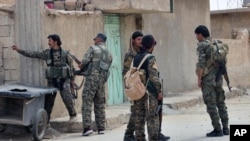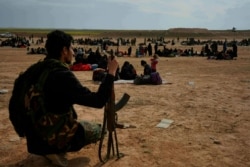A powerful explosion on Wednesday rocked a town in northeast Syria, local sources told VOA.
The car bomb attack, which took place on a main street near the center of Tabqa, wounded at least two security personnel and one civilian, the sources said.
"There are definitely more casualties, but we don't have any details yet as local security forces have blocked the entire area," a Tabqa-based aid worker who requested anonymity for security reasons told VOA.
No one immediately claimed responsibility for the attack, but the Islamic State terror group has carried out similar attacks in the past against U.S.-backed forces in the town and elsewhere in northeast Syria.
Taken by SDF
Tabqa, which is administratively part of Raqqa province, was under IS rule from 2014 until 2017, when U.S.-backed Syrian Democratic Forces took control of the town.
"The city has been secured since we liberated it from [IS] terrorists," an SDF commander, who declined to be identified because he was not authorized to speak to reporters, told VOA. "But these occasional incidents are expected as [IS] still has sleeper cells throughout the region."
SDF officials said they had arrested members of IS-affiliated sleeper cells in two northern Syrian cities this week.
"Counterterrorism units arrested five members of Daesh's sleeper cells in two separate successful raids in Raqqa and Manbij countryside," SDF spokesman Mustafa Bali said Wednesday in a tweet, using the Arabic acronym for IS.
Earlier this week, IS took responsibility for a motorcycle explosion that wounded at least five civilians in the Kurdish-majority city of Qamishli in northeast Syria.
In late March, the SDF declared victory over IS in its last stronghold in eastern Syria. But some experts charge that the group continues to pose a major threat to local forces in the war-torn country.
"IS will remain a threat in Syria as long as there is no political stability in Syria," said Sadradeen Kinno, a Syrian researcher who closely follows IS activities in the country.
"It's true that they don't hold territory anymore, but IS has proven time and time again that it can wage attacks from within communities it once ruled," he told VOA.
Since 2011, Syria has been devastated by a multilayered civil war that has led to the rise of several terror groups, including IS and al-Qaida.
This week, political directors of the U.S.-led coalition against IS convened in Paris to discuss stabilization efforts in Syria and Iraq after the military defeat of the terror group.
Islamic State's "territorial defeat does not represent the terrorist group's eradication or the end of the terrorist threat it poses," the coalition said in a statement Tuesday.
"While it continues to inspire terrorist attacks through active propaganda efforts, [IS] has also proved its resilience and adaptability, continuing to conduct lethal attacks," the statement added. "It has used its active cells in the region to attack our partners and the civilian populations both in Iraq and in Syria where we have recently seen an increase of [IS] attacks in the Levant."





